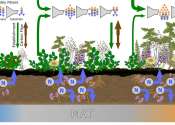Tagging project sheds light on the elusive white shark
Researchers have discovered new white shark behaviors by attaching smart tags and cameras to their fins, revealing never-before-seen details of the lives of the elusive creatures.

Researchers have discovered new white shark behaviors by attaching smart tags and cameras to their fins, revealing never-before-seen details of the lives of the elusive creatures.
Plants & Animals
21 hours ago
0
12

While it's common knowledge that mountaintops are colder than the valleys below, a new University of Vermont (UVM) study is flipping the script on what we know about forests and climate.
Ecology
22 hours ago
0
339

During the unusually dry year of 2018, Sweden was hit by numerous forest fires. A research team led from Lund University in Sweden has investigated how climate change affects recently burned boreal forests and their ability ...
Ecology
Apr 17, 2024
0
1

Models of the global carbon cycle typically include plants, microbes, soil, and the atmosphere. But they may be leaving out an important variable: Animals, from earthworms to elephants, can have a significant, though heretofore ...
Environment
Apr 16, 2024
0
237

Increasing atmospheric concentrations of greenhouse gases (GHGs) are having irreversible consequences for the future of the Earth. However, the general pattern of the impacts of ecological restoration on the three major GHGs ...
Environment
Apr 16, 2024
0
44

In this era of accelerating climate crisis, accounting for all aspects of Earth's carbon cycle is a crucial task. The magnitude of atmospheric carbon burden means trees and forests are limited but important instruments among ...

A team of researchers has unveiled a novel approach to accurately characterizing tree height composition in forests using the Global Ecosystem Dynamics Investigation (GEDI) Light Detection and Ranging (LiDAR) technology. ...
Ecology
Apr 15, 2024
0
1

Permafrost underlies about 14 million square kilometers of land in and around the Arctic. The top 3 meters contain an estimated 1 trillion metric tons of carbon and 55 billion metric tons of nitrogen. Historically, the northern ...
Earth Sciences
Apr 15, 2024
0
47

Perth has just had its driest six months on record, while Western Australia sweltered through its hottest summer on record. Those records are remarkable in their own right. But these records are having real consequences.
Environment
Apr 15, 2024
2
1

Climate change has an effect on forests and trees. They suffer from heat waves and periods of drought. But although we see tree mortality increase as a result, much is still unknown about the underlying mechanisms.
Plants & Animals
Apr 15, 2024
0
46
A forest is an area with a high density of trees. There are many definitions of a forest, based on the various criteria. These plant communities presently cover approximately 9.4% of the Earth's surface (or 30% of total land area) in many different regions and function as habitats for organisms, hydrologic flow modulators, and soil conservers, constituting one of the most important aspects of the Earth's biosphere. Although a forest is classified primarily by trees a forest ecosystem is defined intrinsically with additional species such as fungi. A woodland, with more open space between trees, is ecologically distinct from a forest.
This text uses material from Wikipedia, licensed under CC BY-SA